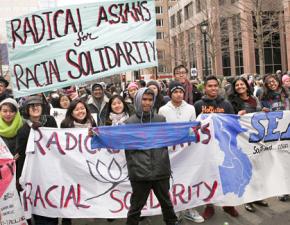Bringing the struggles together in N.C.
and report from Raleigh on this year's march for social justice that mobilized forces of resistance from around the state.
NORTH CAROLINA'S ninth annual Historic Thousands on Jones (HKonJ) march brought tens of thousands of people to the state capital of Raleigh on February 14.
Led by the state NAACP, the march represented more than 100 advocacy groups and organizations, involved in a range of issues. Teacher contingents addressed the underfunding of education and the drive towards charterization; doctors and medical students wore lab coats and demanded the expansion of Medicare; and a giant Planned Parenthood contingent called for a defense of reproductive rights and expansion of Medicare. The march also had a strong labor presence, with many low-wage workers involved in the Fight for 15.
The march came less than a week after the shooting of three Muslim students in Chapel Hill, N.C., on February 17, which sparked many vigils around the country. Thousands of people came together in Chapel Hill, only 40 minutes from Raleigh, to mourn the three students and challenge Islamophobia.
Farris Barakat, brother of victim Deah Barakat, spoke at the pre-rally for the HKonJ march: "They paid for their lives because they stood up for something...that maybe we haven't collectively stood up yet to say: that Muslims are Americans, too." Many people carried signs reading "Muslim lives matter," in solidarity with the Chapel Hill victims and the BlackLivesMatter movement.

The #BlackLivesMatter movement was also present at the march. Chants like "From Raleigh to Ferguson, we will fight, we will win" rang out from the crowd, and marchers carried signs reading #BlackLivesMatter and "Hands up, don't shoot."
Pierre Lacy--the brother of Lennon Lacy, who was found hanged last August in Bladenboro, N.C., likely the victim of a racist lynching--spoke out at the march, too. "Our children have a future," he said, "and we're supposed to stand up and fight for their future." There were many other Black activists at the march, demanding funding for public education, an end to police brutality and more.
THE FEBRUARY 14 march was less than half the size of last year's march, where 100,000 people came together to support the movement's 14-point agenda, including health care for all, voting rights, affordable housing, and abolition of the death penalty.
The HKonJ annual march began in 2007 and has become an annual event for progressive forces in North Carolina. Since the rise of the Moral movement in 2013, the Raleigh demonstration has brought its participants and supporters together for a day of action.
The Moral movement has grown as a response to regressive policies of the Republican-dominated state legislature, though it is important to note that when the HKonJ march began in 2007, Democrats were in control. Since then, North Carolina has seen restrictions on voting rights such as ID requirements and the end of same-day registration; Duke Energy has poisoned the Dan River with 100,000 tons of coal ash with few consequences; and many abortion clinics have been closed for petty code violations.
All this has sparked a collective response to defend the exploited and oppressed on various fronts. The movement is best represented in its simple slogan: "Forward together, not one step back!"
In response to the attack on voting rights, the NAACP led the "Freedom Summer" program in 2014, honoring the 50th anniversary of Freedom Summer in Mississippi in 1964, focused on voter registration and education. Moral Monday rallies around the state were themed "March to the Polls" leading up to the November election.
The Moral movement is right to fight the attack on voting rights. Early voting restrictions and voter ID laws notoriously impact African Americans and other people of color. But the March to the Polls strategy didn't stop Republicans from sweeping elections last year for the state House and Senate. The Republicans won nationally, in part because of very low voter turnout, not because of a wave of support for conservative policies.
But another reason is a lack of electoral alternatives between the two mainstream parties. This is something the Moral movement should recognize. The gathering of tens of thousands of activists for the HKonJ march should be used for actions and to apply pressure to politicians of both parties, not to win votes for one of those parties, which has repeatedly let us down.
To regain political momentum after this year's smaller march, the movement should do two things. It needs to continue to apply pressure on politicians by organizing more public demonstrations and actions, and it should support candidates independent of the two parties--maybe based on the Moral movement itself, advancing its 14-point agenda as a platform.


